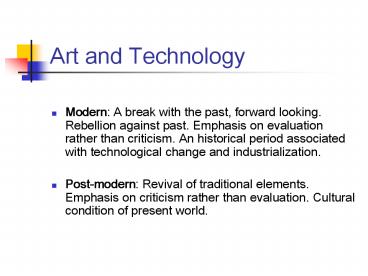Art and Technology - PowerPoint PPT Presentation
1 / 12
Title:
Art and Technology
Description:
Art and Technology. Modern: A break with the past, forward looking. Rebellion against past. ... style, technique, or technology: modern art; modern medicine. ... – PowerPoint PPT presentation
Number of Views:324
Avg rating:3.0/5.0
Title: Art and Technology
1
Art and Technology
- Modern A break with the past, forward looking.
Rebellion against past. Emphasis on evaluation
rather than criticism. An historical period
associated with technological change and
industrialization. - Post-modern Revival of traditional elements.
Emphasis on criticism rather than evaluation.
Cultural condition of present world.
2
Modern (ism)
- Modern Of or relating to recent times or the
present modern history. - Characteristic or expressive of recent times or
the present contemporary or up-to-date a modern
lifestyle a modern way of thinking. - Of or relating to a recently developed or
advanced style, technique, or technology modern
art modern medicine. - Avant-garde experimental. (from Answers.com)
- Modernism Modernism is a cultural movement which
rebelled against Victorian mores. As we have
discussed in class, Victorian culture emphasized
nationalism and cultural absolutism. Victorians
placed humans over and outside of nature. They
believed in a single way of looking at the world,
and in absolute and clear-cut dichotomies between
right and wrong, good and bad, and hero and
villain. Further, they saw the world as being
governed by God's will, and that each person and
thing in this world had a specific use. Finally,
they saw the world as neatly divided between
"civilized" and "savage" peoples. According to
Victorians, the "civilized" were those from
industrialized nations, cash-based economies,
Protestant Christian traditions, and patriarchal
societies the "savage" were those from agrarian
or hunter-gatherer tribes, barter-based
economies, "pagan" or "totemistic" traditions,
and matriarchal (or at least "unmanly"
societies). (from Catherine Lavendar, The Honors
College of The College of Staten Island of The
City University of New York.)
3
Post-modern (ism)
- Post-modern A belief that there are no absolute
social/religious/cultural truths. Relative truths
exist, but they are only valid for a given group
at a given time. Other traditions, religions,
eras, races, genders, cultures, and groups
believe/believed in other, often conflicting,
truths. All of these alternate "truths" are
valid, at least to the group that follows them. - Post-modernism The Post-Modern Age is a time of
incessant choosing. It's an era when no orthodoxy
can be adopted without self-consciousness and
irony, because all traditions seem to have some
validity. This is partly a consequence of what is
called the information explosion, the advent of
organized knowledge, world communication and
cybernetics. It is not only the rich who become
collectors, eclectic travelers in time with a
superabundance of choice, but almost every urban
dweller. Pluralism, the "ism" of our time, is
both the great problem and the great opportunity.
(from "What is Post-Modernism?" by Charles
Jencks)
4
Liberty Leading the People, Delcroix, 1830,
Romantics
5
The Gleaners, Millet, 1857, Realism
6
Old Locomotive, Feininger, 1908, Futurist
7
Passage, Duchamp, Dadaism, 1912
8
Boccioni, Unique Forms of Continuity in Space,
1913, Futurist
9
Light Iris, OKeefe, 1924, Modernism
10
Johns,Map, 1961, Abstract Expressionism
11
Campbell Soup, Warhol, 1968, Pop-Art
12
Cross made by NYC Officer from Twin Towers Metal































